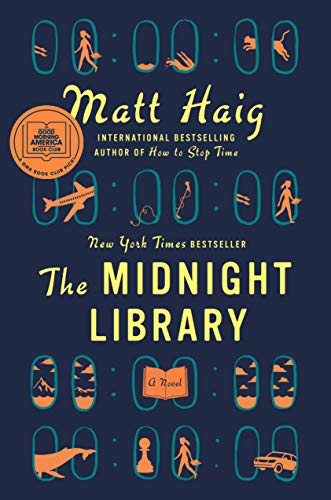Don’t Skip Out: A Book Review of The Midnight Library by Matt Haig
“You could eat in the finest restaurants, you could partake in every sensual pleasure, you could sing on stage in Sao Paulo to twenty thousand people, you could soak up whole thunderstorms of applause, you could travel to the ends of the Earth, you could be followed by millions on the internet, you could win Olympic medals, but this was all meaningless without love.”
Nora Seed has a bad day at work that becomes the worst day. It is The-Worst-Day because it is her last. Her boss lets her go for unreliable attendance and a wet mop attitude. Her neighbor brings news of Nora’s deceased cat. The elderly flat mate she brings his prescriptions to signed up for doorstep delivery. A terrible episode of depression causes Nora to end her life.
Nora’s post death experience manifests (on page 24) in stacks of bookshelves with identical spines. Blue-white fluorescent lights. And a quaint librarian friend, Mrs. Elm, greeting her from across a chess board. The new reality is called the Midnight Library. A place created by part quantum physics part soul searching part alternative timelines. In short, Nora is granted a do over.
So begins Matt Haig’s new fiction, The Midnight Library. A story jumping, experience your own adventure quest through avatar Nora. A protagonist whose identity does factor into the story yet is interchangeable enough to be you or the person next to you on the bus. Readers try on global rock star, parent, Olympian, published professor, glaciologist, best friend, and so many more idealized roles. Nora and the audience don’t find the right fit until nearly the last page of the book.
New York Times reviewer, Karen Joy Fowler, wrote her opinion of why The Midnight Library is so antidotal right now: “A vision of limitless possibility, of new roads taken, of new lives lived, of a whole different world available to us somehow, somewhere, might be exactly what’s wanted in these troubled and troubling times.”
Haig’s book is a human story. Cat hair, stale coffee, and relationship boredom included. Despite what the collective thinks about humanity after 2020; humanness is beautiful, malleable, poetic, simple, and worth every painful mistake. Haig hits the gut before the heart, suicide is horrible and yet he couldn’t have begun Nora’s story any other way. The Midnight Library is a dose of hearing the bad news first, before the good.
In the book’s review by NPR, critic Jason Sheehan writes, “Haig takes what could've been (what has been in so many other books) a dark or sad or curvy or weird spin through the logical and philosophical possibilities of regret crossed with multiverse theory and ... straightens it out.” While some readers and reviewers find this as a fault or oddity of The Midnight Library, I was thankful for Haig stating emotion for what it is. Tragedy is tragic. Happiness is happy. Boredom is opportunity to know these things.
The Midnight Library is worth buying two copies, one for keeps and one for giving. I cannot say for certain if this book would have been so poignant to me in another year, but I think the message is timeless. I may have been more ready to hear it. In the words of Henry Thoreau, “It’s not what you look at that matters, it’s what you see.” This year, in all humanity’s fight I saw life everywhere worth living.
If you enjoyed The Midnight Library these titles cover similar topics or have protagonists with matching voices. Check them out!




